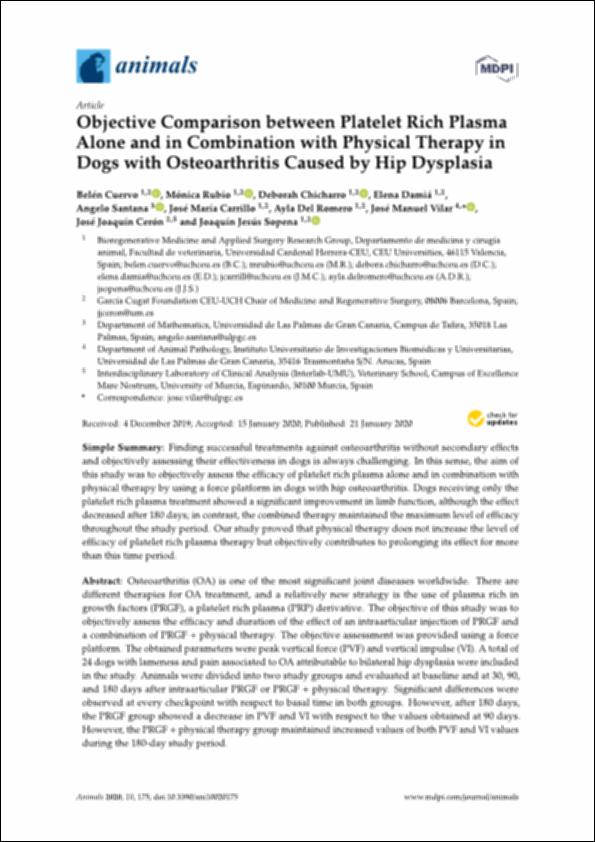Please use this identifier to cite or link to this item:
http://hdl.handle.net/10637/12537Objective comparison between platelet rich plasma alone and in combination with physical therapy in dogs with osteoarthritis caused by hip dysplasia
| Title: | Objective comparison between platelet rich plasma alone and in combination with physical therapy in dogs with osteoarthritis caused by hip dysplasia |
| Authors : | Cuervo Serrato, Belén Rubio Zaragoza, Mónica. Chicharro Alcántara, Deborah Damiá Giménez, Elena Santana, Angelo Carrillo Poveda, José María. Romero Martínez, Ayla del Sopena Juncosa, Joaquín Jesús. |
| Keywords: | Fisioterapia veterinaria.; Cadera - Displasia.; Perros - Sistema musculoesquelético - Enfermedades - Tratamiento.; Blood plasma - Therapeutic use.; Veterinary physical therapy.; Plasma sanguíneo - Uso terapéutico.; Hip joint - Dysplasia.; Crecimiento - Factores - Uso terapéutico.; Growth factors - Therapeutic use.; Dogs - Musculoskeletal system - Diseases - Treatment. |
| Publisher: | MDPI |
| Citation: | Cuervo, B., Rubio, M., Chicharro, D., Damiá, E., Santana, A., Carrillo, J.M., et al. (2020). Objective comparison between platelet rich plasma alone and in combination with physical therapy in dogs with osteoarthritis caused by hip dysplasia. Animals, vol. 10, i. 2 (21 jan.), art. 175. DOI: https://doi.org/10.3390/ani10020175 |
| Abstract: | Osteoarthritis (OA) is one of the most significant joint diseases worldwide. There are di erent therapies for OA treatment, and a relatively new strategy is the use of plasma rich in growth factors (PRGF), a platelet rich plasma (PRP) derivative. The objective of this study was to objectively assess the e cacy and duration of the e ect of an intraarticular injection of PRGF and a combination of PRGF + physical therapy. The objective assessment was provided using a force platform. The obtained parameters were peak vertical force (PVF) and vertical impulse (VI). A total of 24 dogs with lameness and pain associated to OA attributable to bilateral hip dysplasia were included in the study. Animals were divided into two study groups and evaluated at baseline and at 30, 90, and 180 days after intraarticular PRGF or PRGF + physical therapy. Significant di erences were observed at every checkpoint with respect to basal time in both groups. However, after 180 days, the PRGF group showed a decrease in PVF and VI with respect to the values obtained at 90 days. However, the PRGF + physical therapy group maintained increased values of both PVF and VI values during the 180-day study period. |
| Description: | Este artículo se encuentra disponible en la siguiente URL: https://www.mdpi.com/2076-2615/10/2/175 Este artículo pertenece al número especial "Sports medicine and rehabilitation in companion animals: from lameness diagnosis to treatment and prevention". |
| URI: | http://hdl.handle.net/10637/12537 |
| Rights : | http://creativecommons.org/licenses/by/4.0/deed.es |
| ISSN: | 2076-2615 (Electrónico). |
| Issue Date: | 30-Apr-2021 |
| Center : | Universidad Cardenal Herrera-CEU |
| Appears in Collections: | Dpto. Medicina y Cirugía Animal |
Items in DSpace are protected by copyright, with all rights reserved, unless otherwise indicated.


